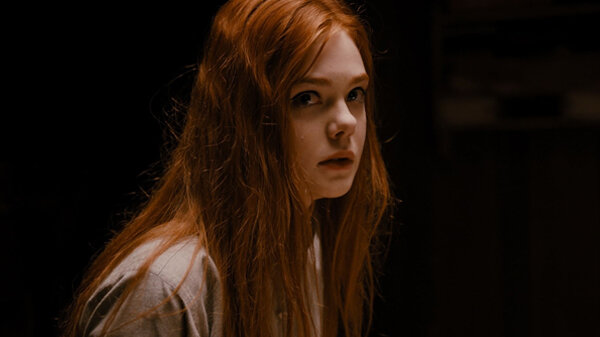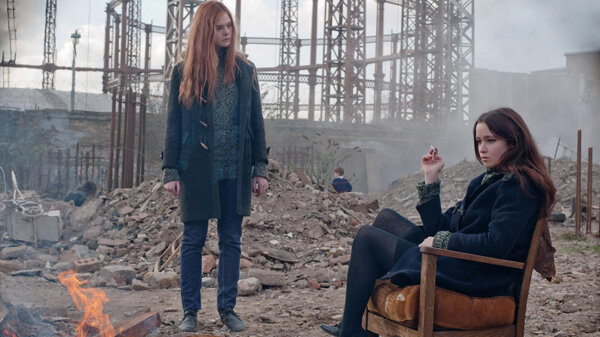Chronicling two best friends coming into the world and growing up together while it unravels, Sally Potter’s Ginger and Rosa lays the blueprint for those living through a global crisis. Leafing through the film’s rich layers with a lucid mind, Tia Glista unpacks the lessons and emotions of Ginger and Rosa in 21 points.
1. Ginger & Rosa begins with an end: a grain-filled red void, a ballooning mushroom cloud, flame and ash carpeting the screen, a wasteland where buildings and families used to be. It is Hiroshima in 1945. It is 80,000 people incinerated in an instant — unprecedented mass death and destruction.
2. It is also the moment when our eponymous heroines are born, at the same hospital, on the same day, at the same time, their mothers in labour side-by-side. Ginger and Rosa literally enter the world at its most desperate and cruel, rehearsing the tension that will underwrite their upbringing: a vexing blend of public and private turmoil.
3. In 1962, Ginger and Rosa are now 17-year-old best friends. London is seized by CND protests for atomic disarmament. The world is captivated by the Cuban missile crisis. Rosa’s father has walked out on her family years prior, and Ginger’s is on the threshold of doing the same. Nuclear families succumb to nuclear bombs.
4. Filmmaker Sally Potter came of age around Ban the Bomb marches in the early 1960s, and was also active at the Greenham Common Women's Peace Camp two decades later. Though Potter’s inspiration for Ginger & Rosa spans both her early childhood and her later activism, the film could theoretically be backdropped by any number of pre-apocalyptic global conflicts, including those that we are facing today: climate change, gun violence, xenophobia, incels, class inequality, coronavirus, economic markets collapsing. According to the American Psychological Association’s annual Stress Report, members of Gen-Z are the least likely of any generation to express hope for their future, and the most likely to disclose experiencing anxiety because of the news; this youngest generation also reports the highest stress levels overall.
5 .At the beach one day, Ginger tells Rosa that they should do something about The Bomb. “I want to live,” she insists, and Rosa says that she does too — that is, if she finds true love. Rosa suggests that they pray for salvation, while Ginger wants to protest and write poems. Her face is etched with concern as she watches Rosa take on the threat of annihilation so nimbly; Potter’s camera keeps finding Ginger’s eyes studying her friend and plumbing for some sign of recognition.
6. A 2003 book revisited the psychological weight of coming of age during the Cold War, finding that by the late 1950s, around 60 percent of children in the United States were having nightmares about nuclear warfare. Educators reported that students were drawing mushroom clouds instead of regular ones, and even composing self-portraits of their own deaths.
7. Later that evening under dim blue light, Rosa makes out with a boy at a bus shelter, as Ginger folds into herself and scrawls something in her notebook. They attend a meeting of the Young Coalition for Nuclear Disarmament, and Ginger stays up late composing a poem about the bomb. Through writing, we see Ginger coping with the world in real time.
8. In her essay “The Artist as Exemplary Sufferer,” Susan Sontag said: “The journal gives us the workshop of the writer’s soul.” She quotes from the diaries of Cesare Pavese, who wrote, “Literature is a defense against the attacks of life. It says to life, ‘You can’t deceive me. I know your habits, forsee and enjoy watching your reactions, and steal your secrets by involving you in cunning obstructions that half your normal flow.’”
9. Sontag deploys the workshop as a symbol for both the actualisation of writing and of personhood. The soul of the teenager is also in a very intensive workshopping period, an evolution into which coming of age stories like Ginger & Rosa give us a glimpse— though in this case, Ginger is not only workshopping herself, but doing so with the feeling that she must also “workshop” the world.
10. Much of the film is told from Ginger’s nihilistic point of view. The camera shakily follows her eye-line as she witnesses the atrophy of her parents’ marriage, Rosa’s existential tailspin, and global political discord. The frame clutches her face as Ginger looks up toward what is coming. Fear is etched into her vision; the future is a scabbed and bittered landscape.
11. While Ginger waits for England to go up in flames, her interior world catches fire. Her father Roland leaves her mother, and he and Rosa begin dating. As she hears them copulate on the other side of a door, Ginger recites the final stanza of T.S. Eliot’s “The Hollow Men”: This is the way the world ends. The country has not yet been annihilated, but everything that Ginger knows and holds sacred suddenly has been.
12. “There never was a war that was not inward,” said the poet Marianne Moore.
13. If coming of age is like the workshopping process — the process of being made — what sense of optimism is possible when the world is simultaneously being unmade? Ginger and Rosa were born when the first atomic bombs were dropped. Birth and death, making and unmaking, collided. As Ginger grows up, her world should expand, but instead it collapses in on itself. Even her cosmically-destined friendship with Rosa shrivels, turns grey, and dies.
14. Ginger hears her father weeping and tells Rosa, “He always does that, especially with Schubert.” Rosa’s face softens as she peers at Roland through a hole in the door. Ginger’s eyes probe her friend and she finally recognises what it is that she is seeing, what Rosa is looking for, and what she believes that she has found in Ginger’s father.
15. How can Ginger feel ready to come of age, or to come into the world, when the world makes so little sense? How can Ginger feel permission to mourn the erosion of her life, when the future of humanity simultaneously hangs in the balance?
16. Toward the film’s conclusion, a bomb goes off in the kitchen: it’s Ginger, and her anger is now unhemmed. “I can’t say it! I’ll explode if I say it!” she protests, but it rushes out of her anyway — that Roland and Rosa have both betrayed her, and are sleeping together. In the fallout from her confession, it is revealed that Rosa is also pregnant, to which Ginger’s mother reacts by attempting suicide. It is the women who suffer the sins of Ginger’s father.
17. The swollen magnitude of women’s anger parts and splits open. Not unlike the slow death of nuclear radiation fading one’s genes, this anger has silently found its way into the lining of their tissues, where it has been guarded and hidden by gendered social codes.
18. After World War II, British women were counted on to retreat from the factories and war rooms and back into the home. It was expected that they would be there to nurture their husbands who came back from the war, and to be servile and small again after all they had contributed. The burden was placed on women to sustain the conventional family in the aftermath of one war and the preamble to another. This period of transition was a push out of the public and into the domestic sphere once again — where women’s needs came second to men, and so their anger stayed hidden and private, even though it still burned.
19. In a final voiceover, Ginger pens a verse to her friend: “We had a dream that we would always be best friends. When we were born, for some it was the end. Now it seems there may not be a tomorrow, but despite the horror and the sorrow, I love our world. I want us all to live. Now Rosa, you’ve asked me to forgive. One day, if mum survives this bitter night, then we shall meet again and I will say ‘I loved you Rosa’ don’t you see. But we are different. You dream of everlasting love. Not me. Because what really matters is to live, and if we do, there will be nothing to forgive … but I’ll forgive you anyway.”
20. An elementary A/B/A/B rhyme scheme lends regularity to the chaos of 1962, but Ginger — or rather Potter — refuses its satisfaction, breaking the sequence in the final line, and cleaving us off from closure. Ginger has not been afforded the luxury of optimism, but she gives it to her friend anyways. She and Rosa have seen the transgressions of their parents’ generation, and they must live in order to correct them.
21. Ginger & Rosa begins with an end, and ends with a beginning. The world, Sally Potter tells us, is out of order.
Tia Glista (@tiaelisabeth) is a critic, creative nonfiction writer, and filmmaker based in Toronto.
Our SALLY POTTER t-shirt is available here proceeds from sales go towards paying our writers.



